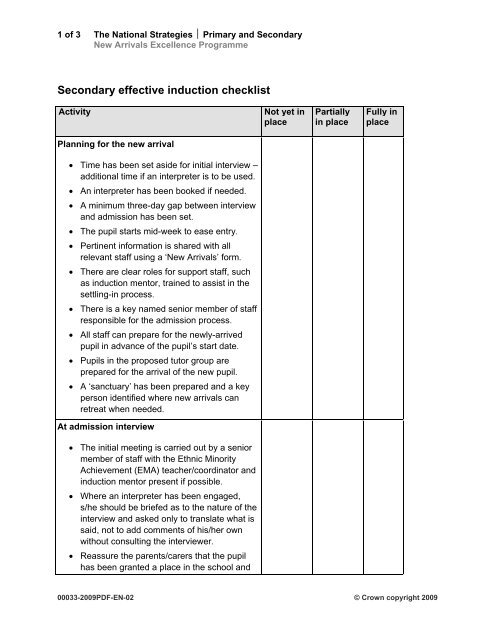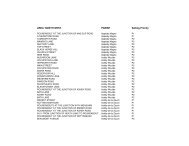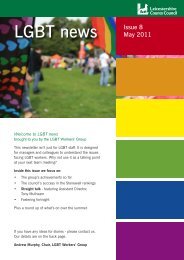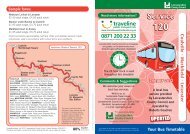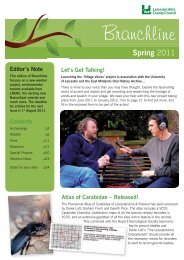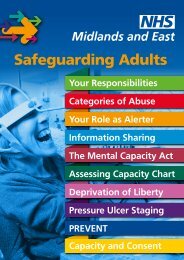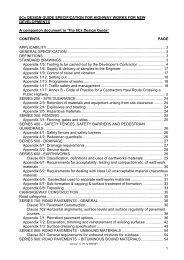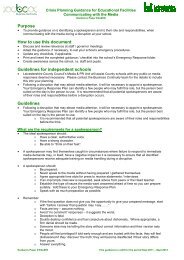Primary effective induction checklist
Primary effective induction checklist
Primary effective induction checklist
You also want an ePaper? Increase the reach of your titles
YUMPU automatically turns print PDFs into web optimized ePapers that Google loves.
1 of 3 The National Strategies <strong>Primary</strong> and Secondary<br />
New Arrivals Excellence Programme<br />
Secondary <strong>effective</strong> <strong>induction</strong> <strong>checklist</strong><br />
Activity<br />
Not yet in<br />
place<br />
Partially<br />
in place<br />
Fully in<br />
place<br />
Planning for the new arrival<br />
Time has been set aside for initial interview –<br />
additional time if an interpreter is to be used.<br />
An interpreter has been booked if needed.<br />
A minimum three-day gap between interview<br />
and admission has been set.<br />
The pupil starts mid-week to ease entry.<br />
Pertinent information is shared with all<br />
relevant staff using a ‘New Arrivals’ form.<br />
There are clear roles for support staff, such<br />
as <strong>induction</strong> mentor, trained to assist in the<br />
settling-in process.<br />
There is a key named senior member of staff<br />
responsible for the admission process.<br />
All staff can prepare for the newly-arrived<br />
pupil in advance of the pupil’s start date.<br />
Pupils in the proposed tutor group are<br />
prepared for the arrival of the new pupil.<br />
A ‘sanctuary’ has been prepared and a key<br />
person identified where new arrivals can<br />
retreat when needed.<br />
At admission interview<br />
The initial meeting is carried out by a senior<br />
member of staff with the Ethnic Minority<br />
Achievement (EMA) teacher/coordinator and<br />
<strong>induction</strong> mentor present if possible.<br />
Where an interpreter has been engaged,<br />
s/he should be briefed as to the nature of the<br />
interview and asked only to translate what is<br />
said, not to add comments of his/her own<br />
without consulting the interviewer.<br />
Reassure the parents/carers that the pupil<br />
has been granted a place in the school and<br />
00033-2009PDF-EN-02 © Crown copyright 2009
2 of 3 The National Strategies <strong>Primary</strong> and Secondary<br />
New Arrivals Excellence Programme<br />
that the interview is only for information<br />
gathering purposes.<br />
Parents are offered all appropriate forms,<br />
such as free school meals (FSM)<br />
applications, uniform grant application, etc.<br />
Administrative staff are welcoming to parents<br />
and pupils and offer sensitive help with form<br />
filling if needed.<br />
Information about the school is made<br />
available in the home language.<br />
Parents are shown around the school.<br />
New arrivals can be given ‘starter packs’<br />
containing pen, pencil, bilingual dictionary (if<br />
appropriate) and homework booklet.<br />
New families can be given ‘welcome packs’<br />
containing a map of the local area, plan of<br />
the school, timetables, list of local community<br />
groups and so on in an accessible format.<br />
Once the new arrival has started<br />
Designate a senior member of staff as key<br />
contact. This might be the head of year, tutor,<br />
EMA coordinator or <strong>induction</strong> mentor.<br />
Allocate trained peer ‘buddies’ or mentors.<br />
Assess the pupil’s level of English,<br />
mathematics and science through<br />
information gained from a wide range of<br />
sources. (Written formal tests are unlikely to<br />
reflect accurately the potential of a pupil new<br />
to the English education system).<br />
Place pupils appropriately: placing pupils in<br />
lower groups or sets because of a perceived<br />
lack of English will not provide them with<br />
good models of English or behaviour or<br />
necessarily be appropriate for their ability in<br />
the subject.<br />
Consider class size and gender balance,<br />
whether there is a same-language speaker in<br />
the class, support during class periods,<br />
gender of teacher and supportive nature of<br />
the class when placing new pupil.<br />
00033-2009PDF-EN-02 © Crown copyright 2009
3 of 3 The National Strategies <strong>Primary</strong> and Secondary<br />
New Arrivals Excellence Programme<br />
Be flexible when timetabling initially as<br />
changes may be needed following further<br />
assessments.<br />
Ensure that tracking and monitoring<br />
systems are in place so that the progress of<br />
new arrivals is carefully followed.<br />
Set short-term social and academic<br />
targets to enable the school to monitor early<br />
progress and to alert staff to any potential<br />
difficulties.<br />
Plan a review meeting a few weeks after<br />
admission with parents, teachers and support<br />
staff to discuss progress and any other<br />
issues arising.<br />
Monitor and review pupils’ learning closely<br />
and frequently to alert staff to potential ability<br />
or difficulty.<br />
00033-2009PDF-EN-02 © Crown copyright 2009


